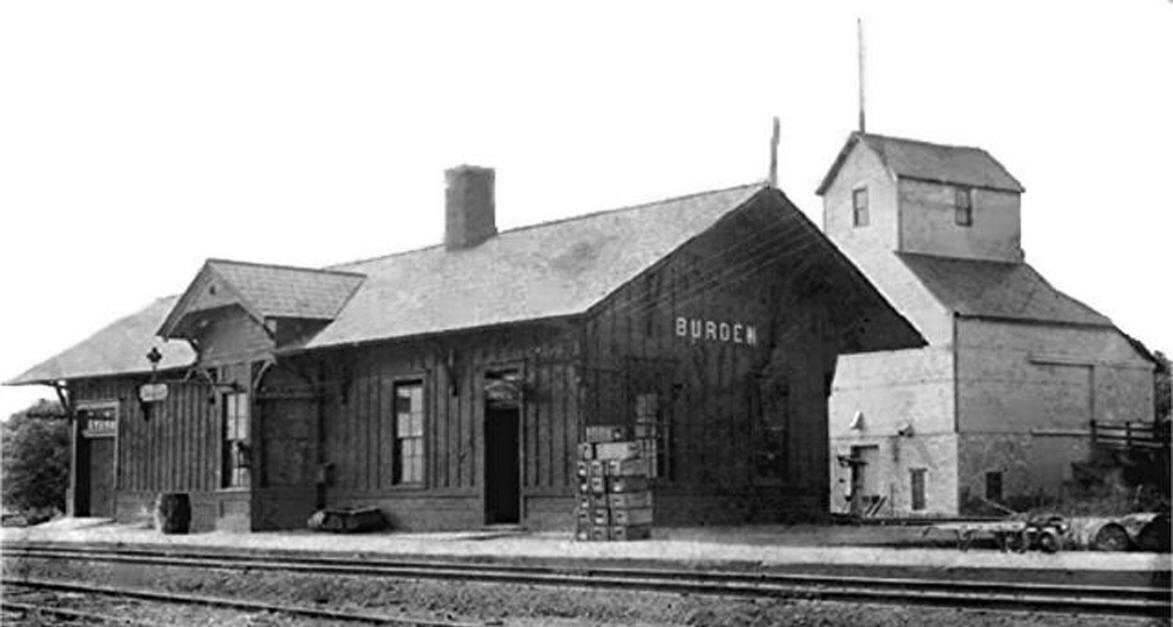
THE CITY of BURDEN
1879 1979
I have been asked to write a historical account of the city of Burden. With the assistance of my wife Margaret, we have compiled the information in this little book which we hope will meet with your satisfaction and pleasure.
Herbert Pickens EARLY HISTORY OF BURDEN
The building of the Kansas City, Lawrence, and Southern Kansas railroad through southern Kansas in 1879-80 fulfilled the highest hopes of the early settlers and marked a new era in the development of progress of Eastern Cowley County.
Now a market for their crops and livestock would be assured, and the tedious task of 'freighting' across the plains would be forever ended.
Along the route of the railroad new towns sprang into existence almost overnight, and earlier landmarks were soon abandoned and many of them are now listed historically as 'extinct important early geographical locations'.
Thus, Burdenville, Kansas (later to be known as Burden) was founded in the fall of 1879. The chosen location was surrounded by broad and fertile fields, green pastures, flowing springs, and running brooks, each contributing in its way toward the creation of a productive and prosperous agricultural community, which was the ambition and the crowning achievement of this particular section in the spring of 1871.
Burden was platted at the crossroads of an eighty-acre tract of land. Robert Goforth Sr. owned the northwest corner, which had been homesteaded by Richard Fitzgerald in 1872. Isaac Gatton owned the northeast corner, having homesteaded it six years earlier. J. P. Harchett owned the southwest, and Thomas Wood the southeast corner.
The Burden town company was organized on September 24, 1879, with the following directors, who were elected to serve five years: 0. B. Gunn, J. Wade McDonald, of Lawrence, Kansas, J. M. Alexander, R. F. Burden, T. K. Johnson, and W. P. Hackney of Winfield, Kansas. Mr. Burden was elected president of the company, and the town was named in his honor.
The purposes of the said company are the purchase, location and laying out a townsite in Cowley County, Kansas, and the sale and conveyance of the same in lots and subdivisions or otherwise. The capital stock of said company shall be four thousand dollars and shall be divided into two hundred shares.
On September 29, 1879, papers for the incorporation of the newly organized company were filled. At the expiration of five years the personnel of the Town Company changed, and R. R. Phelps, E. A. Henthorn, and E. Q. Burden were elected, and R. F. Burden and 0. B. Gunn were re-elected as directors.
There were no buildings on the townsite with the except for a deserted claim shanty which stood on what was later to become the Main street of the town. The early growth of the town was rapid and uninterrupted, and it was destined to become a substantial business center. Its citizens were energetic, resourceful and intelligent. They came from all sections of the country and represented many shades of thought. They transplanted to the new town knowledge and experience gained in other environments, which well qualified them for the task of overcoming obstacles and be successful in establishing the worthy enterprises and l cultural attainments for which the town has already been noted.
On February 6, 1883, Judge E. S. Torrance issued an order for the incorporation of the town. On February 27, 1883.
The first election was held, electing R. R. Phelps, mayor, H. P. Snow, H. W. Young, E. A. Henthorn, J. L. West and Thomas Dyer, councilmen, Harvey Smith, Police Judge, and H. N. Hulse, City Clerk, and Marshall.
At this time the population was more than four hundred and continued to increase until it was listed as one thousand and upward.
The newcomers were becoming acquainted with each other and adjusting themselves to the new surroundings. Much in the way of planning and building was accomplished. Churches, schools and lodges were being organized and built. Commercial activities were many, and almost all lines of business that would contribute to the needs of the pioneers were represented.
In the early years, there were the usual land agents and money lenders along with grocery, dry goods, and hardware stores. In just a few years we had drug stores, two or three hotels, blacksmith shops, lumber yard, livery stables, and various other businesses.
GENERAL MERCHANDISING
Ford and Leonard were the first merchants of the town and built the first store building, which stands on the southwest corner of the main square of the business street. The first load of stone for the structure was hauled by John Fitzgerald, Sr. Mr. Ford was known as a promoter and Mr. Leonard as a man with money and mercantile ability.
William Leflingwell was one of the first grocers of the town, but like Ford, Leonard seemed of migratory inclinations and did not remain long after the organization.
C. W. Jones moved his stock of general merchandise to Burden soon after the town was founded. In 1882 he formed a partnership with H. P. Snow, who with his family came from Kentucky, and they erected a substantial two-story stone building on the southeast corner of the main square. The upper floor was used for a public hall for a number of years, and later became the property of Clinton Lodge No.233 A.F. A.M. Messers Jones and Snow carried an extensive line of general merchandise and were recognized as the leading merchants of Eastern Cowley County for a number of years. Both men were prominently associated with the early local affairs of the town.
Dr. J. A. Chapmen had located in Lazette in 1872, and practiced his profession for some time, and then embarked in the mercantile business. Soon after Burden was founded, he moved his stock to the new town and later purchased the building built by Ford Leonard.
James H. Wood carried a general line of merchandise and continued in business for many years. He occupied many positions of trust during that time and was a representative citizen of Eastern Cowley County.
In 1882, Jesse L. West and Thomas Dyer came from Tampico, Tennessee and established a general store. They were actively identified with the early organization of the town. Mr. Dyer's untimely death occurred in 1885, and later Mr. West embarked in the grocery business.
Joseph 0. Reed and his son, Ed. E. Reed came from Illinois in 1882, and established the New York Store, dealing in dry goods and groceries.
Cunningham and Williams (Matt Cunningham and J. B. Williams) were also early merchants and carried a general stock.
Brooks Bros. (Nathaniel Brooks, T. J. Brooks, and David Brooks) were among the early merchants of the town, and eventually, David Brooks purchased the interest of the two brothers.
HARDWARE IMPLEMENTS
D. B. Cunningham was one of the early dealers in hardware and implements and continued until his death in 1904. Much of the time his brother, C. A. Cunningham, was associated with him in the business. Mr. Cunningham was one of the town builders and occupied a conspicuous place in all local affairs.
John M. Clover, who had homesteaded in Silver Creek Township in 1871, established an implement store in the town soon after it was organized. John Glotfelter and Add Smith were employed as salesmen and were succeeded by George Chenoweth, who came from Illinois in 1881.
Professor Sherrod was also a dealer in implements for a short time.
Then came Tolles Hon, who remained for several years, and were actively identified with the local affairs during their residence in the city.
DRUGGISTS
Hooker Phelps (J, M. Hooker, and R. R. Phelps) owned the first drug store in the town and their store building was the second business house to be erected.
The residence of Mr. and Mrs. Hooker was one of the first dwelling build. Later this firm dissolved partnership with Mr. Hooker moving to another location where he continued in business for many years. W. J. Frazier became associated with Mr. Phelps in the management of his store, and eventually, he and J. M. Henderson succeeded Mr. Phelps in the business. Later J. M. Henderson became the owner of the drug store and he was succeeded by his son Ralph, who is still operating the drug store in Burden.
FURNITURE UNDERTAKING
The first gesture toward the undertaking business in Burden was by Thomas Walch, who was a coffin maker. He was born in England and located in Lazette in 1872.
James Cunningham was the first dealer in furniture and funeral supplies in Burden. In 1889 he moved to Oklahoma and was succeeded by his brother, Chas. A. Cunningham, who conducted the business for a number of years.
Mr. J. M. Hooker was in the furniture and undertaking business for a number of years. He sold out to Ray Denbo who was the first licensed embalmer in Burden, and who also brought the first motor hearse to Burden. He sold out to E. L. Gann, who served the community for many years. In 1948 he sold the business to H. M. Miles who is presently serving the area.
LAND LOAN FIRMS
Through these firms, much of the advertising and booming of the new country was accomplished. E. A. Henthorn established the first land and loan business immediately after the town was platted, and was an enthusiastic booster for its development.
In 1880 S. S. Moore became active in the land and loan business which he conducted for a number of years. He was also an early township trustee and a member of the Board of Education in 1883. R. D. Lake embarked on the land and loan business in 1883 and conducted a real estate office for many years.
LUMBER BUILDING SUPPLIES
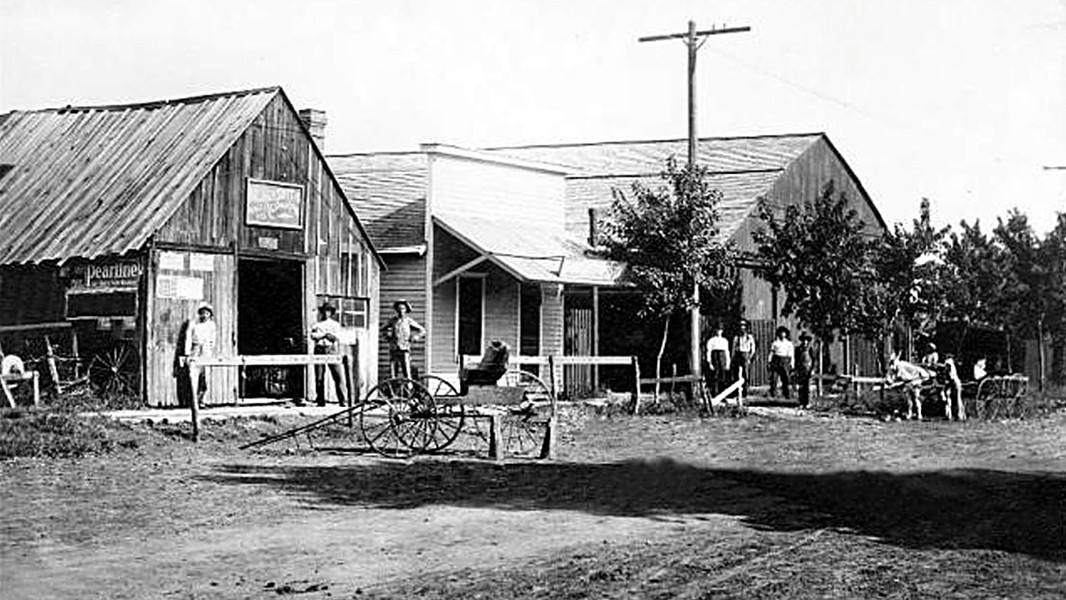
Blacksmith and Lumber Yard,
In the building era of the town, the lumber business was very important, although its history was continually shifting. S. A. Brown. Go. are listed as being early dealers in the lumber and building supplies.
G. B. Shaw established a yard at an early date, which was managed by Henry Rowland.
P. T. Walton, who was the first lumberman in Cambridge, (1880) soon started a yard in Burden.
In 1884 J. G. Crawford came from Girard, Kansas, as the manager of J. B. Carey Lumber Co., which was later purchased by the Rock Island Co. By consolidation, the Long-Bell Co. became the only yard in town, and Mr. Crawford continued as manager until 1889 and was succeeded by Henry Rowland.
BLACKSMITHS
A. B. Tanner was one of the first blacksmiths to settle in the new town.
David McIntosh located a shop near the crossroads soon after the town was platted, and enjoyed a splendid patronage from the early settlers. He later moved his shop to South Main street and continued his trade until failing health compelled his retirement.
Robert Ogilvey, who came from Scotland was an early day blacksmith. Courtney Skinner operated a wagon shop for years and his services were much in demand.
GRAIN FUEL
John W. Ledlie was one of the early grain and coal dealers. His office was located near the railroad tracks on the east side of Main street, and he bought and shipped grain on an extensive scale. He was prominently associated with the early growth of the town and held various local offices.
T. M. James was another dealer in grain and fuel at an early date and was identified with the local history of the town. He was a member of the Board of Education, and organist in the Methodist church for a number of years.
LIVERY FEED STABLES
H. W. Young was the pioneer liveryman of the town and during the boom days, his turnouts were much in demand by the land seekers.
Aaron Tredway, in partnership with his brother, Harvey Tredway, embarked in the livery feed business in 1884. For a number of years, Mr. Tredway operated the Blue Jay bus between the depot and the hotels of the town. This bus was the outstanding public conveyance of the town and was engaged by the early citizens for parties, picnics and fishing expeditions.
J. A. Willison and William Bernaud operated livery stables at a later date.
HOTELS
The first hotel was owned and operated by J. H. McCumber, who had moved a dwelling in from the country and remodeled it to meet the fast-growing demand for housing of the new citizens. W. B. Slaten later became the manager of the hotel, which was known as the Commercial hotel--home for Travelers.
Another hotel was built by the Town Company north of the depot, on the west side of Main street, and was managed by Mr. and Mrs. Solomon Hisler, and was known as the Hisler House.
In 1880 S. S. Moore moved to Burden from Tisdale township and built The Summit House which he managed for several years.
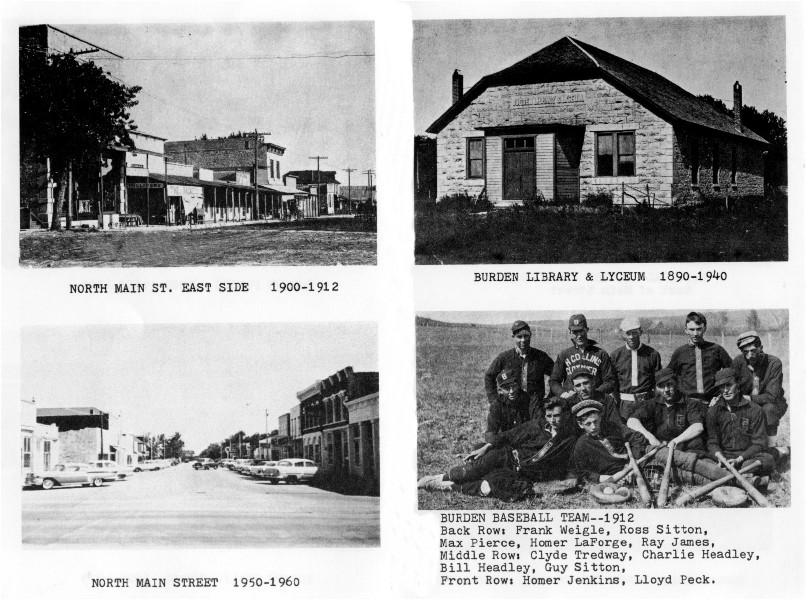
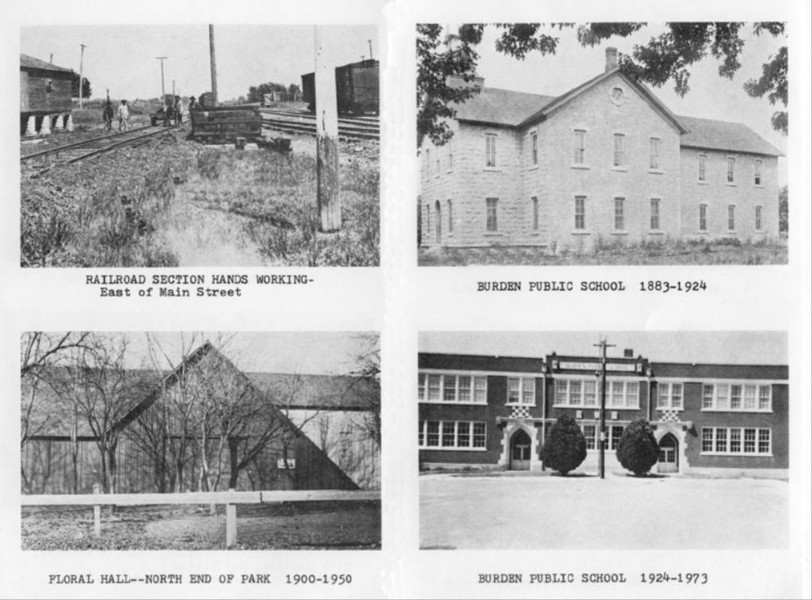
BANKS
The Burden Bank was the earliest bank of the town and was founded by W. A. Henthorn and A. J. Henthorn in 1881. In 1883 the Brooks Bros. Bank was chartered with a paid-up stock of $20,000. The directors were S. A. Brooks, T. J. Brooks, A. P. Brooks and Nathaniel Brooks. S. A. Brooks was president and Nathaniel Brooks was the cashier. After several years in business, the stock was liquidated. The State Bank of Burden was organized in 1884. The original stockholders were G. B. Shaw, J. F. Stodder, F. C. Jocelyn, Thos. D. Wayne, 0. B. Gann, Mary H. Gunn, P. T. Walton, and Robert F. Burden. With the exception of Messers. Stodder, Walton and Burden, the stockholders were non-residents of the town. G. B. Shaw was the first President and J. F. Stodder the first Cashier. Both Messers. Burden and Walton served later as president of the institution. The two-story bank building was built the same year at a cost of $6000. Much of the stone used in its construction came from a quarry in the vicinity of Winfield. By the consolidation, the State Bank eventually became the only bank in the town. In 1898 Mr. Stodder was elected President, and Samuel C. Day became Vice-president, and Chas. A. Truesdell, Cashier. After the death of J. F. Stodder, Mr. S. C. Day became President, F. G. Stodder Vice-president and C. A. Truesdell Cashier. In the late twenties, the Bank was sold to the Coffey family and in the fifties to W. E. Temple. No Business Institution in the history of Burden has contributed so consistently to the permanency of the town as the bank. The building just north of the Harris tavern housed the Miles Bank and the building just south of the Cowboy Shop was built by the Brooks family to house their Bank. Both buildings later served as Post Office Buildings.
PROFESSIONAL MEN
Dr. J. M. Wright was the first physician in Burden. He was born in Illinois and practiced medicine in Iowa prior to his migration to Cowley County in 1877. He later became a resident of Arkansas City, Kans. Dr. J. H. Phelps, brother of R. R. Phelps, was another early Burden doctor. Other early-day physicians were Dr. H. B. Rude, Dr. Cabtree, Dr. A. A. Newman, Dr. M. B. McClung, and Dr. W. H. Manser. Dr. Manser came from his native state, West Virginia, to Burden soon after he was graduated in medicine from the Ohio Medical College in 1884. For about thirty-five years he was a citizen of the town, and devoted himself exclusively to his Profession and was recognized as the leading physician of Eastern Cowley County. Doctor E. E. Brooks served the community from 1908 until 1955. In his day he had to be a specialist in every ailment. During his years of service in the community, he delivered more than two thousand babies. Dr. J. J. A. Manser was the first dentist to locate in Burden. He was skilled and proficient in his profession, and his practice extended over a wide territory. In 1884, S. J. Day, attorney-at-law, accompanied by his family, came from Hartford Conn. Mr. Day built a commodious home in the north part of town, and then he built the two-story business building in the center of the block on the east side of Main street, where he maintained a law office in the upper rooms, and the lower floor was occupied by different business firms.
POST OFFICE
In 1877, prior to the founding of Burden, a post office was located at Moscow which was three miles west and one and a half miles north of our present location. S. S. Hogue was postmaster. A post office building was the third business house built in Burden, and E. A. Henthorn was the first postmaster, receiving his appointment under President Hayes. Ed Millard was another early postmaster. J. G, Crawford was appointed in April 1889, and served approximately five years. He was succeeded by John W. Ledlie.
STATION AGENTS
The railroad was completed in February 1880 and 0. W. Shepherd was the first station agent. He was succeeded by H. H. Mansfield who became an agent in 1880.
MILLING INDUSTRY
Early in the history of the town A. P. Brooks established a grist mill, which stood south of the Library building. A flour mill known as the old stone mill was built south and east of the railroad track. It was owned by a stock company and operated by Mr. McLean. At a later date, W. W. Canine of Indiana became the owner. This plant proved of great benefit to the farmers in disposing of their wheat crops. The flour was known by Gold Crown and was well received by the trade territory. Later Samuel C. Day became the owner, and the mill was moved into town, and located north of the depot on the west side of Main street. The mill was finally sold to Pierce Brooks, who dismantled the machinery and moved it to Nardin, Oklahoma.
NEWSPAPERS
Burden has always had a newspaper. D. 0. McCray established the New Enterprise in late 1879. In 1882 the name was changed to the Burden Enterprise and was owned by E. A. Henthorn and Jack Floyd. Later it was controlled by Henthorn and his brother A. J. Henthorn. In 1884 S. A. Brooks and W. K. McComas became owners and A. W. West was editor and publisher. Still, later McCornas purchased Mr. Brook's interest and W. L. Hutton was editor and publisher. In 1905 Mr. Hutton founded the Burden Times. The Burden Times was purchased by Dick Alexander in 1918. Dick was editor of the paper until his death in 1953. The Alexander family continued to edit it until 1966 when it was sold. In 1967 the name of the paper was changed to the Cowley County Reporter.
SCHOOLS
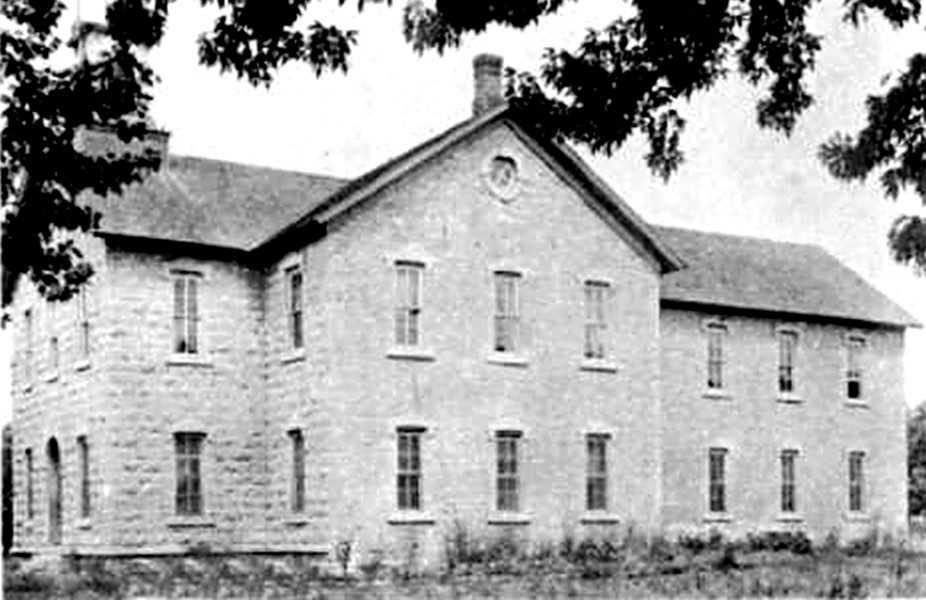
As our forefathers moved into this country and founded towns, they followed up by establishing schools and churches. The first school was generally known as the Culp School and was located one mile north and a half-mile east. It was also called the Brooks Academy by some people. In the summer of 1881, the district 78 schoolhouse that had been built on the Gulp homestead in 1878, was moved to town and located on the east side of Main street. E. A. Millard and Mattie West were the first teachers. The following year T. J. Rude and Mary A. Rude were employed.
In the summer of 1883 a four-room structure of stone, costing $4000, was completed. The quarry on the John Lauppe homestead west of town furnished much of the stone for the construction. Hiram T. Albert, R. 0. Stearns and Lizzie Burden (Cunningham) composed the teaching staff. The enrollment was one hundred fifty-four. The first High School Graduating class was composed of three members, Lula Burden, Effie Young, and Arthur Brooks. Fifty-two years later when Burden High School Alumni Association was organized these three graduates were living and two of them were present at the meeting. Going back to the schoolhouse building, two rooms were added later to the stone structure and this building served the community until 1924 when a new modern brick building was attached to the front of the stone building which served the district until 1973 when the present building was built. Our first school buildings did not have a gymnasium so in 1915 a large frame building was erected on the school grounds to serve as a gymnasium. This structure burned in 1933. At that time a brick structure was added to the existing school building.
During the early years, there were many one-room rural schoolhouses erected and served the educational needs of their local districts. From these small schools and the Burden High School came citizens who through the years have served this community and made it the place we like to call home today.
CHURCHES
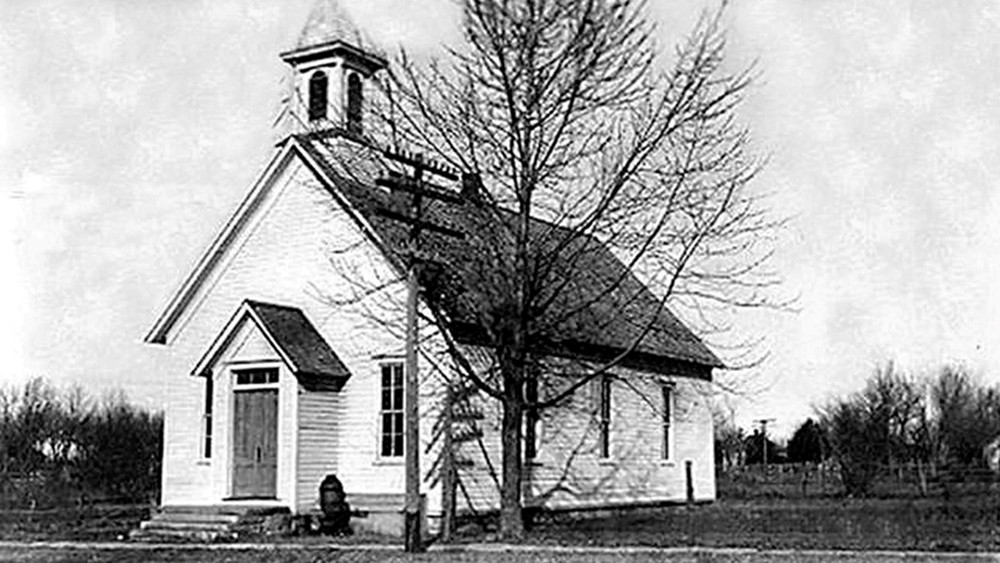
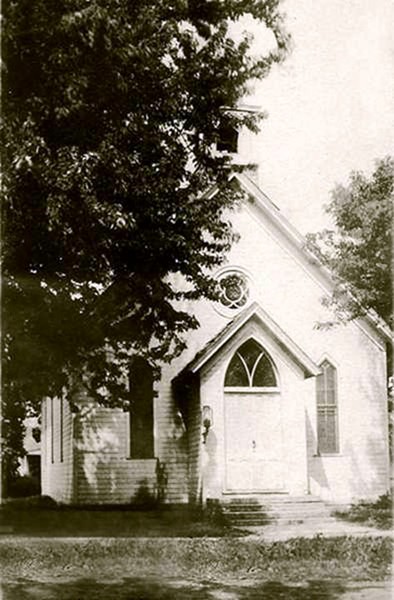
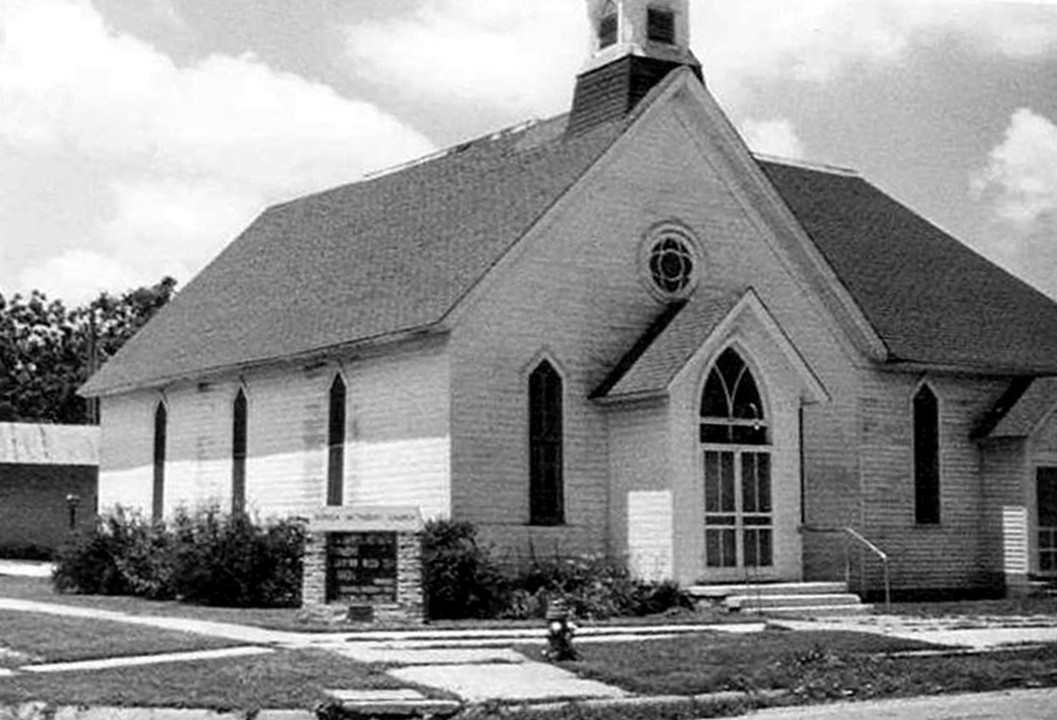
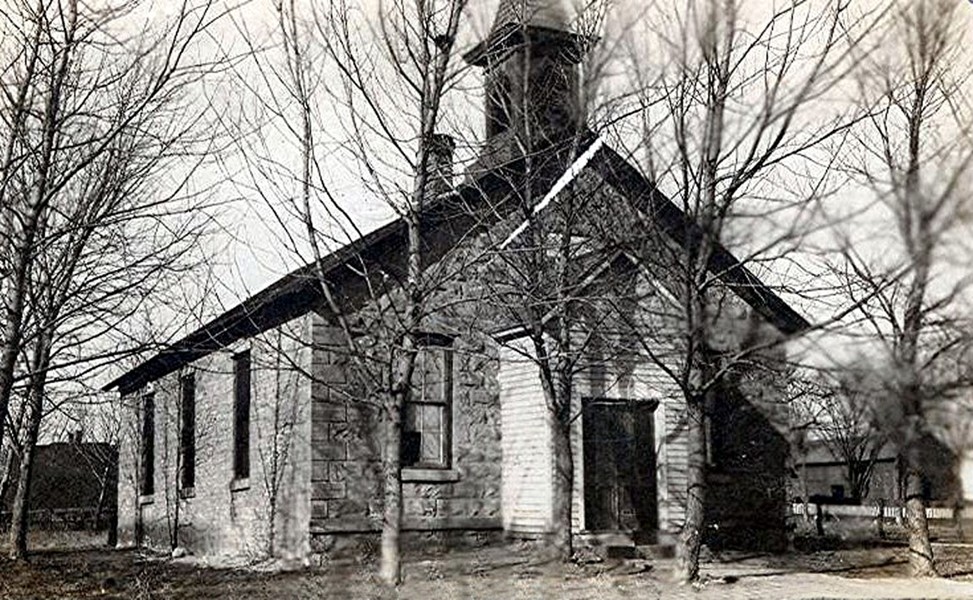
Churches are the most important part of the community. Various denominations held preaching services in nearby school- houses prior to the founding of the town. Rev. C. A. Stine had organized a Methodist class in 1877-78 which had been meeting in the Culp schoolhouse. In 1881 this class began the building of the Burden Methodist church, which was completed and dedicated in 1882. Rev. C. W. Commons and J. Q. Knight were the first pastors. The first Sunday School of the town was organized by the Methodist people and with an enrollment of seventy-five. Dr. J. H. Phelps was superintendent. Early settlers of the Baptist faith had organized a church at the Silver Creek schoolhouse equally as early as had the Methodists, and they began holding services in the schoolhouse as soon as it was moved into town, and later held meetings in the Methodist church on alternate Sundays. The earliest ministers were Rev. Henry Thomas, Rev. R. S. Thompson, and Rev. S. P. Firestone. The Baptist church was built in 1885. The Church of Christ had congregations at Lazette and the Baltimore schoolhouse at an early date, and members of these congregations established preaching services in the schoolhouse soon after it was moved, and elder J. W. Shively organized a congregation with thirty-five members in the spring of 1881. The Church of Christ disbanded a few years ago for lack of membership. The Baptist and Methodist churches are still serving the community as are two new churches the Assembly of God Church and the Bible Baptist Church.
BURDEN LIBRARY OR LYCEUM BUILDING
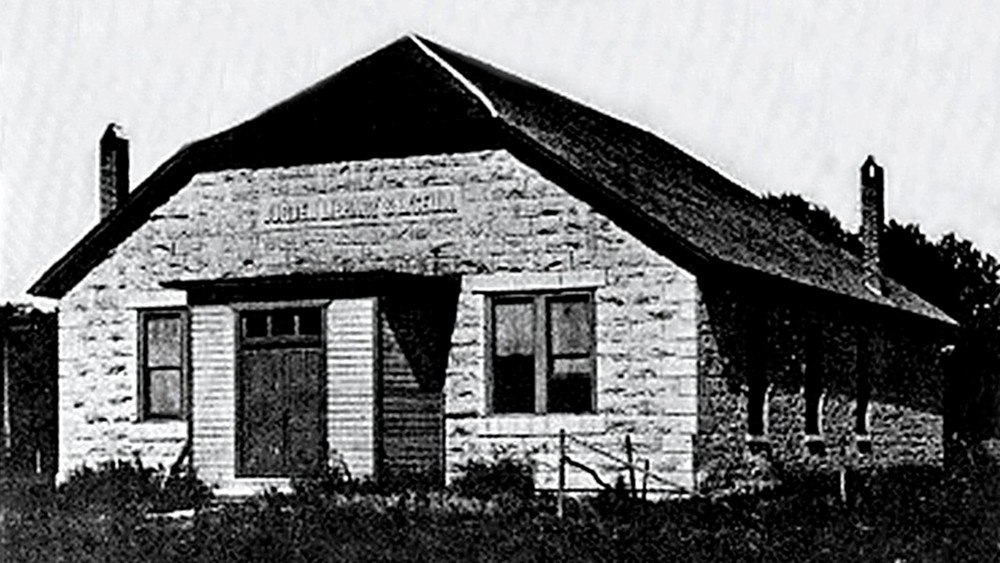
Before the days of School Auditoriums, we had a building in town known as the Burden Lyceum and Library Building. The building was erected by a stock company in 1886 and was one of the outstanding landmarks of the long ago in Burden. For almost a half-century it served its purpose in the community. Very few towns of like population have had such a substantial and comfortable community center. When the people gathered here, they were at their best--relaxed and in a holiday mood, ready to enter whole-heartedly into whatever event was presented.
The commencement exercises were all held here, and the fathers and mothers of the community and their sons and daughters have been graduated from its platform. All gatherings that contributed toward cultural development were held here--home talent plays, recitals, benefits, winter lecture courses, and all traveling entertainments. All political, patriotic and memorial gatherings were held in this building. Back in the early days of the town, when the men of the G. A. R. were young and active, a long line of veterans of the Civil War would march from their headquarters, under the command of Dick Fitzgerald or John Ledlie, to this building on Decoration Day, to pay tribute to their fallen comrades.
This building was located on the southeast corner of Main and Sixth streets. Time and circumstances have closed the doors and destroyed the Lyceum Building, but to any early citizen of Burden, the memory lingers of the important place it occupied in the trend of events in the first fifty years of the town's existence.
FOREST PARK
The ground on which the park was platted was deeded to the Town Company by Frank Hanshett (or Hatchett) and wife. The Town Company deeded it to the Burden Park Association (of which Nathaniel Brooks was President and P. T. Walton, Sec'y) in January 1886. The Park Association deeded it to the city of Burden on March 7, 1892, for a consideration of four hundred ninety-five dollars. The Eastern Cowley County Fair Association was organized in 1894, with R. F. Burden, President, J. M. Henderson, Sec'y, C. U. Brooks, Treas. and Ed. E. Reed, General Manager. The first directors were A. F. Sit ton, J. F. Henderson, S. M. Fall, F. M. Savage, A. 0. Elliott, John Fitzgerald, Ad F. Smith, and J. W. Leach. The first Eastern Cowley County Fair was held September 20-21-22, 1894, and the advance advertising promised to bring together the largest crowd ever brought to Burden upon an occasion. Let it be understood there will be an abundance of cold water and good shade to accommodate three thousand people--this being the first meeting of the association we decided to place the admission fee at 10 and 15 cents, which is within the reach of all.
LOOKING BACK
As we look back, we can see that one of the greatest events was the coming of the railroad. They were communicating links with the outside world. They were the reason for the founding of the majority of the many towns and cities of our nation. So, it was with Burden. They brought in the various kinds of merchandise needed in our community. They hauled out to market all that we produced. They carried the mail in and out of town. They carried people in and out when the occasion demanded it. They were our connecting link with the outside world. At one time we had four passenger trains daily, two going East and two going West. We also had two local freight trains which unloaded shipments at the Depot. Later Steam Locomotive passenger trains were replaced by One Car Gasoline Motor Coaches, they were called 'Doodle Bugs'. There was a lot of glamour and fascination with the Steam Engine pulling several passenger cars or a long line of boxcars and open coal or gravel cars. The excitement was greater if you were boarding the train to go somewhere.
Through the years we have had many fine citizens who carried on in the tradition and example set by the families who founded this town. There have been bakers, bankers, barbers, butchers, hotel innkeepers, merchants, livery stable owners, lumbermen, garage owners, car dealers, carpenters, painters, postmasters, restaurant owners, newspaper publishers, druggists, doctors, undertakers, grain dealers, mechanics, tavern operators, gasoline and fuel vendors, utilities and servicemen, plumbers, teachers and ministers along with a host of farmers and stockmen who have all contributed to the general welfare of the town and community.
The items of this little book were taken from the information gathered by Edith Collins and from items published from time to time in the Burden newspapers.
It is nearly impossible to name everyone who has contributed to the growth and success of the town as someone might be left out who others would feel was an important cog in the growth and success of the town. My suggestion is for each of you to pick out the person you feel should be remembered and dwell on his memory as you knew them.
Thanks to all who donated items and pictures for this little book.
H. H. P.
We wish to thank Richard VanSickle for his artwork in producing the cover for this book.